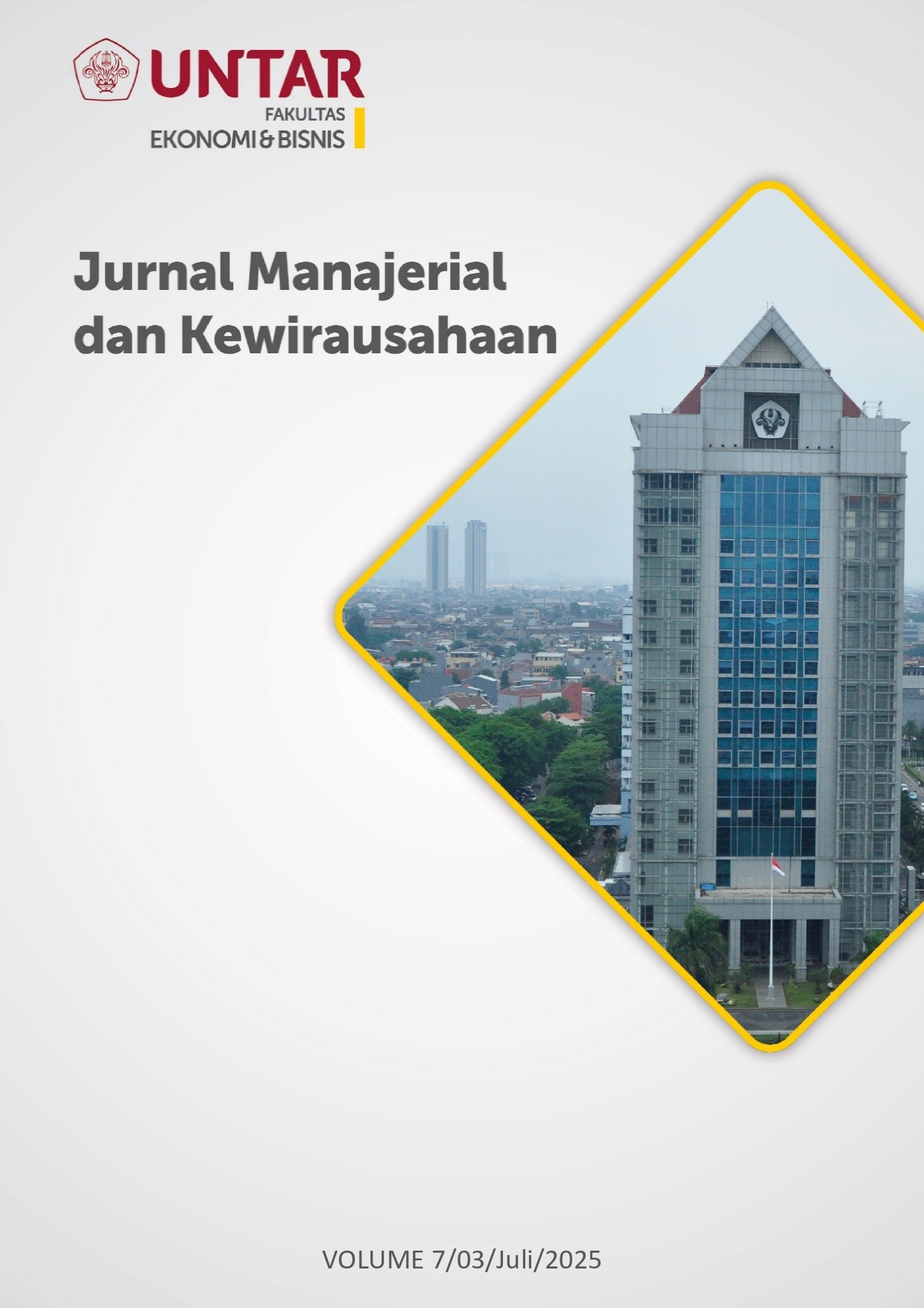Keberlanjutan sebagai Mediator: Pengaruh Orientasi Kewirausahaan terhadap Keunggulan Kompetitif pada UMKM Kuliner
Main Article Content
Abstract
Penelitian ini bertujuan untuk menguji pengaruh orientasi kewirausahaan terhadap keunggulan kompetitif melalui peran mediasi keberlanjutan terhadap UMKM kuliner di Jakarta Utara. Penelitian ini menggunakan pendekatan kuantitatif dengan pengumpulan data melalui survei terhadap 247 pelaku UMKM di bidang kuliner. Analisis data ini dilakukan menggunakan metode structural equation modeling (SEM). Hasil penelitian menunjukkan bahwa orientasi kewirausahaan berpengaruh positif terhadap keberlanjutan, keberlanjutan berpengaruh positif terhadap keunggulan kompetitif dan orientasi kewirausahaan berpengaruh positif terhadap keunggulan kompetitif. Selain itu, keberlanjutan terbukti memiliki peran mediasi terhadap orientasi kewirausahaan dan keunggulan kompetitif. Menunjukkan bahwa penerapan strategi keberlanjutan dapat memperkuat hubungan orientasi kewirausahaan terhadap keunggulan kompetitif.
This study aims to examine the effect of entrepreneurial orientation on competitive advantage through the mediating role of sustainability on culinary MSMEs in North Jakarta. This research uses a quantitative approach with data collection through a survey of 247 MSME players in the culinary field. This data analysis was carried out using the structural equation modelling (SEM) method. The results showed that entrepreneurial orientation has a positive effect on sustainability, sustainability has a positive effect on competitive advantage and entrepreneurial orientation has a positive effect on competitive advantage. In addition, sustainability is proven to have a mediating role on entrepreneurial orientation and competitive advantage. Indicates that the implementation of sustainability strategies can strengthen the relationship of entrepreneurial orientation to competitive advantage.
Article Details
Section

This work is licensed under a Creative Commons Attribution-NonCommercial-ShareAlike 4.0 International License.
This work is licensed under a Jurnal Muara Ilmu Ekonomi dan Bisnis Creative Commons Attribution-ShareAlike 4.0 International License.,/p>
References
Dess, G. G., & Picken, J. C. (2000). Changing roles: leadership in the 21st century. Organization Dynamics, 28(3), 18-33. http://dx.doi.org/10.1016/S0090-2616(00)88447-8
Felix. (2020). Orientasi kewirausahaan dan kemampuan inovatif terhadap kinerja UMKM. Jurnal Manajemen Bisnis dan Kewirausahaan, 5(3), 267-272. https://doi.org/10.24912/jmbk.v5i3.11861
Nazmfar, H., Eshghei, A. A., & Pourmoradian, S. (2019). Analisis indeks daya saing perjalanan dan pariwisata di negara-negara Timur Tengah. Jurnal Penelitian Pariwisata Asia Pasifik, 24(6), 501-513. https://doi.org/10.34127/jrlab.v14i2.1583
Nuringsih, K., & Nuryasman, M. N. (2021). The role of education in sustaining environmental sustainability at rural region in Yogyakarta. Dalam International Conference on Economics, Business, Social, and Humanities, 6-22. https://doi.org/10.2991/assehr.k.210805.003
Revell, A., Stokes, D., & Chen, H. (2010). Small Businesses and the Environment: Turning Over a New Leaf? Business Strategy and the Environment, 19(5), 273-288.
Utama, L., Widjaja, O. H., & Lego, Y. (2020). Pengaruh orientasi kewirausahaan terhadap keunggulan kompetitif pada UKM industri kreatif dengan kapasitas inovatif sebagai faktor mediasi dalam masa pandemik Covid-19. Jurnal Bina Manajemen, 9(1), 30-43. https://doi.org/10.52859/jbm.v9i1.113
Vogt, J., Döringer, S., & Rüth, S. (2021). Sustainability in small and medium-sized enterprises: A systematic literature review. Sustainability, 13(1), 132.

